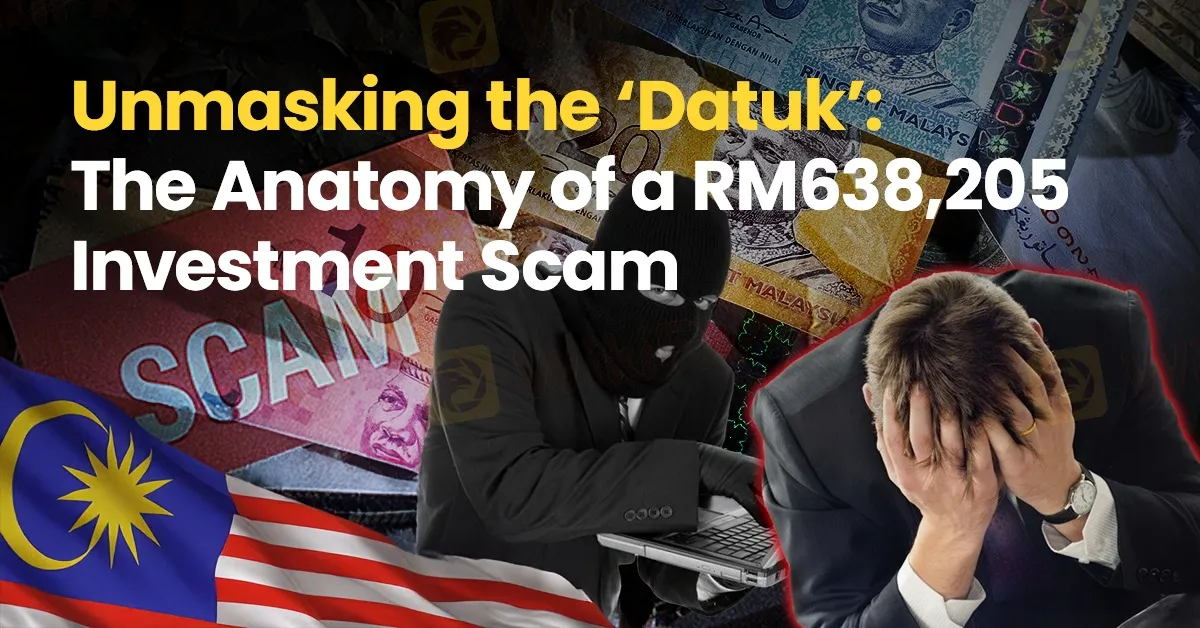简体中文
繁體中文
English
Pусский
日本語
ภาษาไทย
Tiếng Việt
Bahasa Indonesia
Español
हिन्दी
Filippiiniläinen
Français
Deutsch
Português
Türkçe
한국어
العربية
Unmasking the ‘Datuk’: The Anatomy of a RM638,205 Investment Scam
Abstract:Authorities in Malaysia have launched an extensive investigation into a fraudulent stock investment scheme, which has resulted in losses amounting to RM638,205.

Authorities in Malaysia have launched an extensive investigation into a fraudulent stock investment scheme, which has resulted in losses amounting to RM638,205. The scheme is allegedly orchestrated by an individual holding the honorary title of ‘Datuk’.
The Bukit Aman Commercial Crime Investigation Department (CCID), under the leadership of Datuk Seri Ramli Mohamed Yoosuf, has so far opened 15 investigation papers into the case. Between 19 January and 20 February, a total of 32 reports related to the fraudulent scheme were filed, with total reported losses exceeding RM1.3 million.
Preliminary investigations have traced the company‘s establishment to 24 February 2022. It was found to have two directors, one of whom, the ’Datuk, was appointed on 10 May 2022. Authorities have classified the case under Section 420 of the Penal Code, which pertains to fraud-related offences.

Further examination of records from the Companies Commission of Malaysia has revealed that the company had a paid-up capital of RM6.9 million, with a total of 179 shareholders, consisting of 175 individuals and four corporate entities. Among the 15 cases currently under investigation, 11 victims have been identified as shareholders in the company.
The fraudulent scheme gained wider attention following media reports stating that 65 individuals had lodged complaints with the Malaysian International Humanitarian Organisation (MHO). These individuals claimed to have suffered collective losses amounting to approximately RM2.5 million after being misled into investing in the companys stock investment programme.
According to MHO secretary-general Datuk Hishamuddin Hashim, those responsible for the scheme had allegedly promoted common stock investment programmes to the public without issuing a valid prospectus, a requirement under financial regulations to ensure transparency and investor protection.
The rise of such fraudulent investment schemes underscores the importance of due diligence before committing funds to any financial platform. In an effort to safeguard investors, platforms like WikiFX provide essential tools to verify the legitimacy of brokers and financial institutions. With a comprehensive database featuring global broker profiles, regulatory status updates, and user reviews, WikiFX equips investors with the necessary information to make informed decisions.

Additionally, WikiFXs risk rating system and alerts help detect unlicensed or suspicious entities, allowing investors to identify potential threats before falling victim to fraudulent schemes. By conducting thorough background checks on brokers and investment platforms, individuals can significantly reduce their exposure to financial scams and better protect their assets.

Disclaimer:
The views in this article only represent the author's personal views, and do not constitute investment advice on this platform. This platform does not guarantee the accuracy, completeness and timeliness of the information in the article, and will not be liable for any loss caused by the use of or reliance on the information in the article.
Read more

Scam Couple behind NECCORPO Arrested by Thai Authorities
Thai authorities have dismantled a cryptocurrency investment fraud syndicate, arresting a Chinese national and a Thai woman linked to a multi-million baht money laundering operation. The pair, who led an extravagant lifestyle funded by illicit activities, have been connected to 28 separate fraud cases, with total financial damages exceeding 30 million baht.

Unmasking the ‘Datuk’: The Anatomy of a RM638,205 Investment Scam
Authorities in Malaysia have launched an extensive investigation into a fraudulent stock investment scheme, which has resulted in losses amounting to RM638,205.

ATFX Enhances Trading Platform with BlackArrow Integration
ATFX integrates the BlackArrow trading platform, offering advanced tools for forex, crypto, and stocks with automation and real-time analytics for traders.

UK Hits HSBC, 3 Banks with £104.4M Fine for Bond Misconduct
HSBC, Citi, RBC, and Morgan Stanley fined £104.4M by CMA for sharing sensitive bond market info, distorting UK gilts competition from 2009-2013.
WikiFX Broker
Latest News
Germany's Election: Immigration, Economy & Political Tensions Take Centre Stage
WikiFX Review: Is IVY Markets Reliable?
Brazilian Man Charged in $290 Million Crypto Ponzi Scheme Affecting 126,000 Investors
ATFX Enhances Trading Platform with BlackArrow Integration
Become a Full-Time FX Trader in 6 Simple Steps
IG 2025 Most Comprehensive Review
SEC Drops Coinbase Lawsuit, Signals Crypto Policy Shift
Construction Datuk Director Loses RM26.6 Mil to UVKXE Crypto Scam
Should You Choose Rock-West or Avoid it?
Franklin Templeton Submitted S-1 Filing for Spot Solana ETF to the SEC on February 21
Currency Calculator







